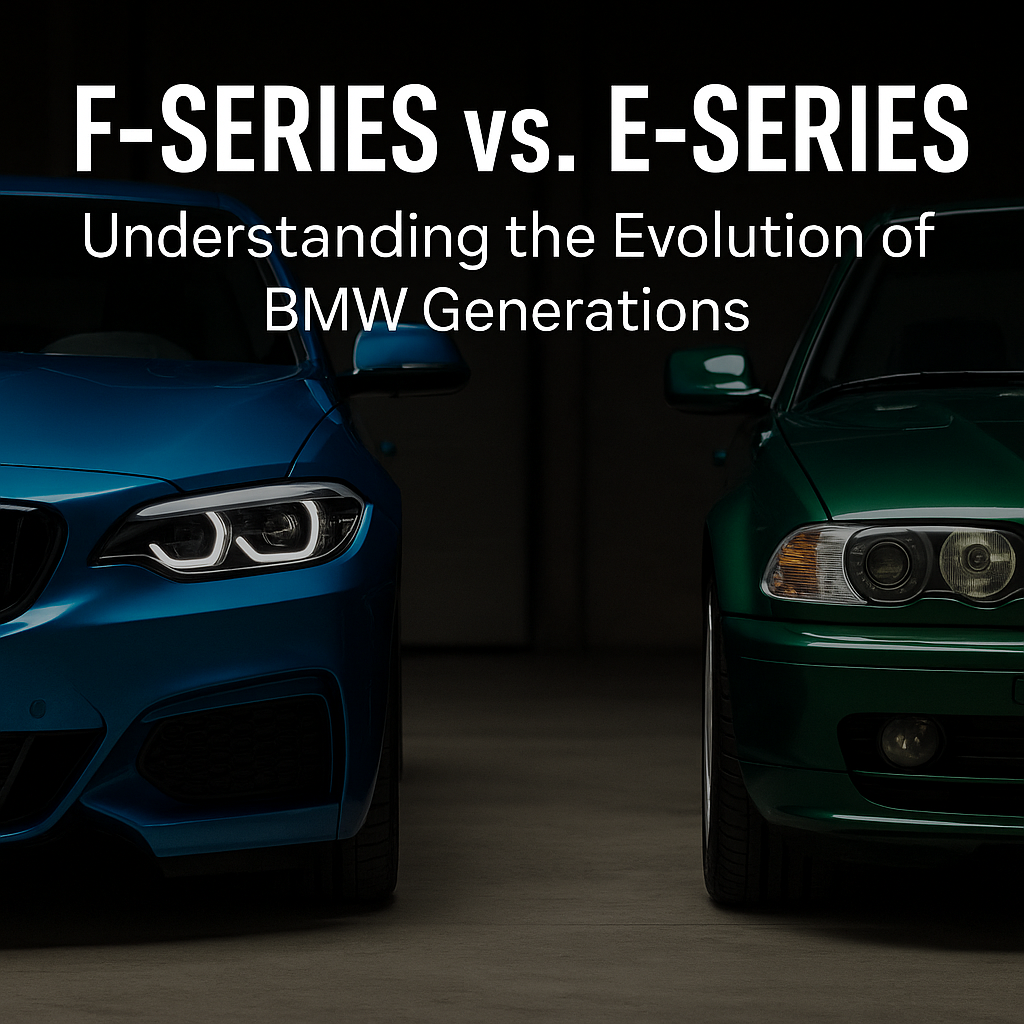
🚗 The Ultimate Guide to BMW E-Series and F-Series Models
Share
Whether you're a seasoned BMW enthusiast or just dipping your toes into the world of Bavarian engineering, you've probably heard people refer to models by codes like E36, E90, or F30. But what do these letters and numbers mean, and how can they help you better understand, buy, or maintain a BMW?
Let’s break it all down.
🔧 What Are E-Series and F-Series BMWs?
BMW assigns internal chassis codes to each generation of its vehicles. These codes help distinguish one version of a model from another and are especially useful when buying parts or looking up vehicle specs.
-
E-Series: Stands for Entwicklung, the German word for “development.” These models span roughly from the early 1980s through the late 2000s.
-
F-Series: Introduced around 2008, F-series models represent a leap in design, tech, and efficiency.
🕰 E-Series Overview (Classic & Beloved)
Here are some of the most popular E-Series models:
| Chassis Code | Model | Years Produced | Notes |
|---|---|---|---|
| E30 | 3 Series | 1982–1994 | Cult classic, boxy design, first M3 |
| E36 | 3 Series | 1990–2000 | Sleeker, more modern, affordable entry-level tuner |
| E39 | 5 Series | 1995–2003 | Considered one of the best sedans ever made |
| E46 | 3 Series | 1999–2006 | Blends modern design with analog feel |
| E60 | 5 Series | 2003–2010 | Bold styling, iDrive introduced |
| E90/E91/E92/E93 | 3 Series sedan/wagon/coupe/convertible | 2005–2013 | Last of the naturally aspirated straight-6s |
🔩 Parts Tip: Many E-series cars are now in the sweet spot for restoration and modification. BBC Auto Parts carries hard-to-find OEM trim, electronics, and engine components—perfect for E46 and E39 builds.
🚀 F-Series Overview (Modern and Tech-Focused)
As BMW stepped into the modern era, the F-Series brought more tech, refined powertrains, and turbocharging across the board.
| Chassis Code | Model | Years Produced | Notes |
|---|---|---|---|
| F10 | 5 Series | 2010–2017 | Sleek, powerful, first full turbo lineup |
| F30 | 3 Series | 2012–2019 | Widely popular, efficient 4-cylinder turbos |
| F22 | 2 Series Coupe | 2014–2021 | Compact, RWD, enthusiast favorite |
| F32/F33/F36 | 4 Series Coupe/Convertible/Gran Coupe | 2013–2020 | Sporty split from the 3 Series |
| F15 | X5 | 2013–2018 | Midsize luxury SUV, loaded with tech |
🛠 Maintenance Tip: F-series models often use electric steering, turbocharged engines, and more integrated electronics, so diagnostic tools and compatible parts are key. We can help source reliable modules and sensors.
🔄 E vs. F Series — What’s the Big Difference?
| Feature | E-Series | F-Series |
|---|---|---|
| Engine Type | Mostly naturally aspirated | Mostly turbocharged |
| Electronics | Simpler, less integrated | Complex, more digital |
| Driving Feel | Raw, mechanical | Refined, comfortable |
| Parts Availability | Many becoming rare | Still widely available |
| Ideal Buyer | DIYers, tuners, collectors | Commuters, tech lovers, tuners |
🧰 How This Helps When Shopping for BMW Parts
When you're looking for replacement parts, trim, or performance upgrades, knowing your chassis code is essential. A 2006 325i (E90) and a 2013 328i (F30) might sound similar—but they’re completely different under the hood.
That’s why we organize all our inventory on BBC Auto Parts by chassis code. Whether you need an E46 MAF sensor or a F10 control arm, we’ve got you covered.
🏁 Final Thoughts
Understanding BMW chassis codes like E36 or F30 isn’t just car nerd trivia—it’s the key to unlocking the right parts, knowing your model’s strengths, and getting the most out of your ride.
Have questions about your specific BMW model or need help finding the right part?
Reach out to us at BBC Auto Parts — or leave a comment below and we’ll help you figure out what fits!
